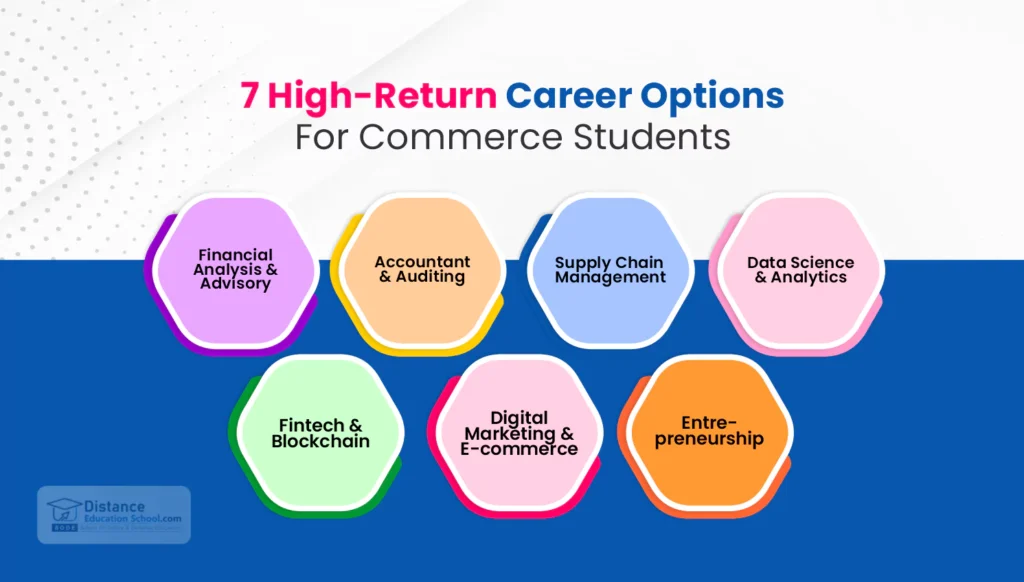
7 Most Profitable Career Options for Commerce Students
As we enter , the job market is undergoing significant changes due to new technologies and various global economic conditions. For students studying commerce, it’s a time full of new possibilities but also some challenges. There are so many career options for commerce students, enabling them to capitalize on the emerging job opportunities in the market.
This blog post will help commerce students understand the best career options available this year. We’ll look at how new technologies like artificial intelligence, blockchain, and big data are changing fields like finance, marketing, and international business. We’ll also talk about how the economy changes, like the growing focus on green businesses and the rise of flexible jobs.
The aim is to give commerce students a good picture of the job market in 2024, focusing on the career prospects for commerce students. We’ll discuss which careers are growing, what skills are needed, and how to prepare for these new opportunities. By the end of this blog, students should have a better idea of how to plan their careers in these changing times.
7 High-Return Career Options for Commerce Students
The commerce field offers a wealth of lucrative careers for commerce students. They can make their careers really successful and satisfying by using what they know about business smartly. They can also add skills in things like understanding data or marketing online to make themselves even more valuable.

1. Financial Analysis and Advisory
Financial analysts and advisors are pivotal career options for students who have completed their BBA degree course in finance-related fields from recognized UGC-DEB Approved Universities in India. These people guide businesses and individuals through investment decisions and financial planning. They interpret economic trends, assess financial data, and consult on investment strategies to enhance financial performance. Their expert advice is crucial in navigating financial markets and ensuring optimal asset allocation.
Key Roles
- Financial Analyst: Provides insights based on financial data to inform investment decisions, including forecasting and performance evaluation. They analyze past financial performance and predict future results to guide companies and investors.
- Investment Advisor: This type of advisor offers personalized advice on investments, helping clients achieve financial goals through strategic planning. They craft investment strategies to individual financial situations and preferences, ensuring alignment with clients’ life goals.
- Risk Manager: This person identifies and mitigates financial risks, focusing on long-term financial security and compliance. They develop risk management frameworks to protect assets and ensure regulatory compliance, reducing potential financial losses.
Skills Required
A strong grasp of financial software, quantitative analysis, and critical thinking are essential for careers in commerce. Excellent communication skills and ethical decision-making also play a critical role in maintaining client trust and adherence to regulations. Proficiency in data analysis tools and financial modeling techniques is important, as is the ability to present complex information in an accessible manner.
Future Outlook
The demand for financial expertise will remain high, particularly with increasing complexities in investment products and market regulations. The evolving digital finance landscape, including fintech and cryptocurrencies, will also require new skills and adaptive strategies. Career options for commerce students are plentiful in this area, as professionals in this field must stay informed about global economic changes and technological advancements.
2. Accountancy and Auditing
Accountancy and auditing play an important role in ensuring transparency and efficiency in financial reporting, which is crucial for maintaining trust among investors, stakeholders, and the public. Students who have completed their BCom and MCom courses can opt for this field. These are significant career options for commerce students. They help organizations adhere to financial regulations and contribute to stable economic growth. They also play a significant role in risk management and corporate governance.
Key Roles
- Certified Public Accountant (CPA): A CPA manages accounting services and ensures compliance with tax laws. They also engage in auditing, strategic tax planning, and financial advisory services, acting as trusted consultants to optimize financial health and business performance.
- Auditor: Inspects accounting data and practices to ensure accuracy and compliance with regulatory standards. Auditors often recommend improvements, helping organizations enhance their financial procedures and controls. They also play a crucial role in corporate transparency and accountability.
- Forensic Accountant: Investigate financial discrepancies and frauds, using their skills to uncover hidden information and assist in legal proceedings. Forensic accounting is one of the career options for commerce students. Forensic accountants also contribute to resolving disputes and preventing financial crimes, making them integral to the integrity of financial systems.
Skills Required
Skills in accountancy and auditing, key careers for commerce students, extend beyond technical expertise. Professionals must possess attention to detail, a solid understanding of accounting standards, and ethical judgment. Strong analytical skills and the ability to communicate complex financial information clearly are essential.
Future Outlook
Automation is on the rise in accounting, yet the critical thinking required for auditing and forensic analysis remains essential. There is a growing demand for professionals who can interpret complex financial data and make informed decisions. With financial ecosystems increasingly global, opportunities for international accounting expertise are expanding. These trends highlight promising career options for commerce students interested in pursuing specialties within accounting.
3. Supply Chain Management
Effective supply chain management is crucial for the smooth operation of businesses in various sectors, especially in a globalized economy. It ensures that products are delivered on time, inventory levels are maintained efficiently, and costs are minimized throughout the distribution process. Strategic supply chain management also helps companies adapt to changes and disruptions, making them more resilient. Exploring career options for commerce students who obtained degrees in BCom, MCom, BBA, and MBA through distance learning or regular mode. This field can be highly beneficial, including many essential business activities.
Key Roles
- Supply Chain Analyst: Optimizes the flow of goods and services, analyzing performance data to drive improvements. They use advanced analytics tools to predict trends and solve logistical problems.
- Logistics Manager: Oversees the transportation of goods, managing logistics operations to enhance efficiency and reduce costs. They coordinate with vendors and transportation companies to ensure timely deliveries.
- Procurement Officer: This position manages the purchasing of goods and services for organizations, negotiating with suppliers to secure the best terms. The officer also ensures compliance with legal and ethical standards and manages supplier relationships to nurture long-term partnerships.
Skills Required
These roles, which are key commerce career options, demand excellent problem-solving, logistical planning, and negotiation skills. Effective communication and working collaboratively across different departments are also essential. For this role, having strong analytical skills and being good with supply chain software are crucial to handle the flow of goods and information well.
Future Outlook
Innovations such as AI and blockchain are set to redefine supply chain strategies, increasing efficiency and reducing costs. The adoption of new technologies enhances transparency and security in the supply chain, while a focus on sustainability encourages green practices that consider environmental, social, and economic factors. This evolution presents various career options for commerce students interested in supply chain management.
4. Data Science and Analytics
Data is now at the core of strategic decision-making, with data science and analytics playing a pivotal role across industries. These fields are crucial for utilizing data’s potential to fuel innovation, enhance operations, and elevate customer experiences. The increase of data on digital platforms has made analytics a crucial part of business strategy, providing lots of job options for commerce students.
Key Roles
- Data Scientist: Extracts insights from complex data sets, developing predictive models influencing strategic decisions. They employ various statistical techniques and tools to interpret the vast amounts of data businesses accumulate today.
- Business Analyst: Bridges the gap between IT and the business using data analytics to inform policy and operational decisions. They translate complex data findings into actionable insights that significantly affect a company’s profitability and efficiency.
- Data Engineer: Designs and maintains data systems, ensuring data integrity and accessibility for analysis purposes. They also optimize data flow and collection to better suit the analytical needs of data scientists and analysts.
Skills Required
Statistical analysis, programming, and an understanding of machine learning are crucial for a commerce career option. Being good at solving problems and explaining complicated ideas to people who aren’t experts is also really important. Mastery of data visualization tools and techniques is also increasingly sought after by employers.
Future Outlook
The reliance on data is only set to increase, making data science one of the most lucrative career options for commerce students. As industries become more data-driven, the demand for skilled data science and analytics professionals is expected to grow exponentially.
5. Fintech and Blockchain
Fintech and blockchain are modernizing the financial sector, offering faster and more secure transactions and innovative financial services. As technology matures, it continues to push boundaries, enabling real-time, cross-border payments with enhanced security features. These advancements also open up numerous career options for commerce students, who can utilize their knowledge in areas such as financial analysis, regulatory compliance, and digital asset management.
Key Roles
- Blockchain Developer: Creates and implements blockchain protocols, developing secure transaction processes. They play a critical role in designing decentralized applications (DApps) architecture and ensuring they are scalable and robust.
- Fintech Project Manager: Oversees projects in financial technology, ensuring they meet both customer needs and regulatory standards. This role is crucial in connecting technical teams and business stakeholders to match project goals with market needs.
- Compliance Expert: Ensures fintech products meet legal standards, keeping up with global financial regulations and implementing necessary changes. Career options for commerce students often involve monitoring industry trends to preemptively adjust policies and practices, ensuring proactive compliance management
Skills Required
These careers, including commerce career options, require a blend of technical programming skills, an understanding of financial markets, and regulatory knowledge. Project management skills are also vital to successfully deploying fintech solutions. Proficiency in cybersecurity measures is essential to protect data integrity and maintain trust.
Future Outlook
As regulations evolve and technology advances, fintech and blockchain are expected to dominate financial innovations. Integrating Artificial Intelligence (AI) and Machine Learning (ML) into these sectors is anticipated to further enhance the automation and efficiency of financial services, opening up various career options for commerce students.
6. Digital Marketing and E-commerce
In the digital age, marketing, and commerce have transformed drastically. Digital marketing and e-commerce are now fundamental to any business’s success, relying heavily on online presence and digital transactions. Career options for commerce students have expanded as businesses are adapting to new digital marketing strategies that target a tech-savvy audience and use advanced analytics to track consumer behavior.
Key Roles
- Social Media Manager: Manages a company’s interactions with the public through social media platforms, ensuring brand consistency and engagement. This role is critical in utilizing the power of social conversations to increase engagement and brand loyalty.
- SEO Specialist: Optimizes website content to rank higher in search engine results, focusing on keyword research and user engagement. The specialist must stay up-to-date with Google’s ever-changing algorithms and balance organic and paid search strategies.
- E-commerce Analyst: Analyzes online sales data to improve business strategies, including customer behavior analysis and sales optimization. This role is becoming increasingly sophisticated with adopting predictive analytics to forecast trends and sales outcomes.
Skills Required
These roles, suitable as careers for commerce students, require a combination of analytical ability, creativity, and a deep knowledge of digital platforms and consumer behavior. Strong communication skills and strategic thinking are essential to adapt to rapidly changing trends. Digital marketers need to be adept at data visualization tools and have proficiency in digital advertising platforms.
Future Outlook
The digital marketplace is expected to grow exponentially, with more businesses expanding their online presence and digital marketing budgets increasing. This expansion presents numerous career options for commerce students interested in digital marketing, e-commerce, and data analysis. The focus will likely shift towards automation and integration of cross-channel platforms for a better consumer experience.
7. Entrepreneurship
Entrepreneurship offers commerce students the chance to pave their own paths by establishing startups or becoming business consultants. It empowers individuals to convert innovative ideas into viable businesses, encouraging economic growth and creating new job opportunities. As one of the promising career options for commerce students, this field is ideal for those who are self-motivated, resilient, and eager to make a significant impact through their business ventures.
Key Roles
- Startup Founder: This person initiates and manages new business ventures, driving the company’s vision and strategic direction. They are often involved in every aspect of the business, from product development to fundraising and marketing.
- Business Consultant: Provides expert advice to improve business strategies, helping companies optimize operations and increase profitability. They may also assist businesses in navigating complex market dynamics and regulatory environments. This role is among the career options for commerce students, utilizing their understanding of business and finance.
- Venture Capitalist: Invests in high-potential startup businesses, assessing potential returns and managing investment risks. Venture capitalists also provide strategic guidance and networking opportunities to help startups scale effectively.
Skills Required
Innovation, risk management, and leadership are crucial for success in entrepreneurship, a rewarding commerce career option. Entrepreneurs must also excel in strategic thinking, adaptability, quick decision-making ability, financial management, and interpersonal communication to effectively lead their businesses and inspire their teams.
Future Outlook
The supportive ecosystem for startups continues to thrive, with ample funding opportunities and a growing network of mentors and incubators. As technology evolves and consumer needs shift, the landscape for startups remains promising, offering endless possibilities for innovation, including career options for commerce students.
Conclusion
In this blog, we have explored various promising career options for commerce students in commerce that are highly relevant in 2024. As the global market landscape evolves, these careers are increasingly pivotal in shaping the future of commerce. For commerce students, knowing about these fields can be incredibly rewarding. When choosing a career path, it’s important for commerce students to consider both personal strengths and the market’s specific needs. For those who are curious to learn more or have specific questions about distance education feel free to reach out directly.
Most Popular Blogs

Distance MCA at Jain University: Fees, Syllabus, Eligibility & Career Scope

Why Pursue an Online MBA in Logistics and Supply Chain Management in 2026?

Panjab University Distance MBA Admissions 2026: Eligibility, Fees & Process

Online MBA in Artificial Intelligence and Machine Learning: Course, Fees, Eligibility & Career Scope

Complete Guide to Acharya Nagarjuna University Distance Education 2026



















